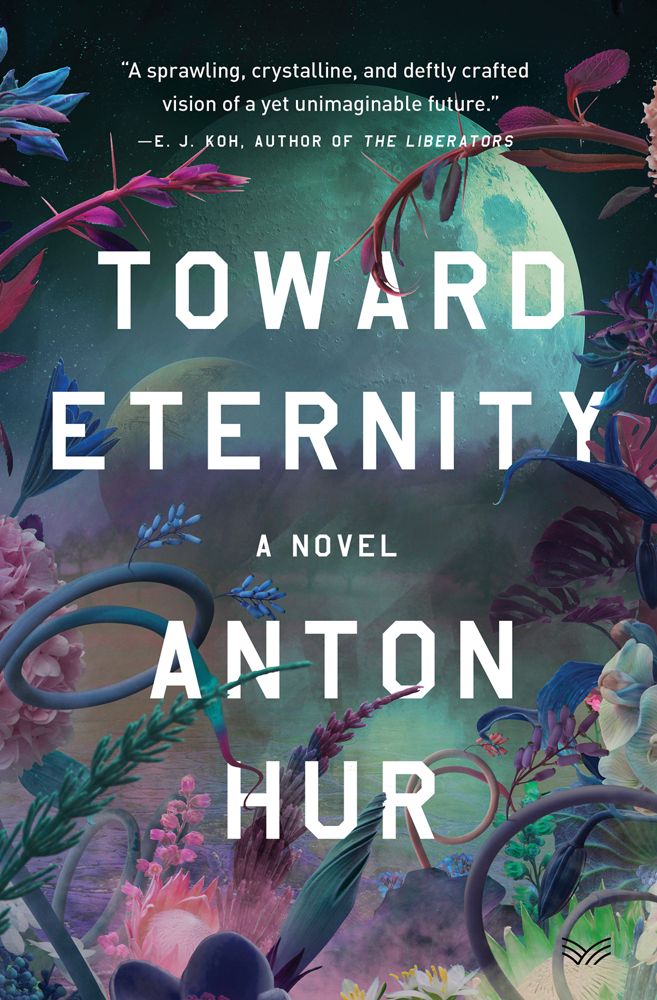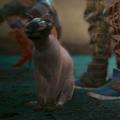sol2070 reviewed Toward Eternity by Anton Hur
Tech-spiritual page-turner fable
4 stars
(em português → sol2070.in/2025/03/livro-toward-eternity-estoria-tecno-espiritual/ )
Reading Anton Hur's science fiction “Toward Eternity” (2024, 256 pgs), I thought about how genuinely interesting futuristic stories end up being spoiled by the ideals of today's techno-economic domination.
The book is a page-turner that would have sounded perfect 20 or 30 years ago, about transhumanist immortality. I read it in two days, stimulated by the fantastic narrative power. The problem is that transhumanist technologies, and all the cargo that comes with them, are being worshipped and sought after especially among technobillionaires and their associated futurist sects ( en.wikipedia.org/wiki/TESCREAL ).
Last week I listened to a great episode of the podcast Tech Won't Save Us ( techwontsave.us/episode/151_dont_fall_for_the_ai_hype_w_timnit_gebru.html ), with AI researcher Timnit Gebru — it was she who coined, with Émile P. Torres, the term “Tescreal” to refer to these sects. Reading the novel, I was reminded several times of something they mentioned in this …
(em português → sol2070.in/2025/03/livro-toward-eternity-estoria-tecno-espiritual/ )
Reading Anton Hur's science fiction “Toward Eternity” (2024, 256 pgs), I thought about how genuinely interesting futuristic stories end up being spoiled by the ideals of today's techno-economic domination.
The book is a page-turner that would have sounded perfect 20 or 30 years ago, about transhumanist immortality. I read it in two days, stimulated by the fantastic narrative power. The problem is that transhumanist technologies, and all the cargo that comes with them, are being worshipped and sought after especially among technobillionaires and their associated futurist sects ( en.wikipedia.org/wiki/TESCREAL ).
Last week I listened to a great episode of the podcast Tech Won't Save Us ( techwontsave.us/episode/151_dont_fall_for_the_ai_hype_w_timnit_gebru.html ), with AI researcher Timnit Gebru — it was she who coined, with Émile P. Torres, the term “Tescreal” to refer to these sects. Reading the novel, I was reminded several times of something they mentioned in this program: tech-billionaires and tech-bros have stolen even the imagination of the future.
About 25 years ago, information technology began to stop being seen as a promise to improve the world. Although there have always been dystopian imaginings, there used to be a prevailing optimism about the possibilities of the internet, computer science and even science in general.
Nowadays, in the face of people like Musk, companies like Google and Apple, or even mega-corporations in any sector, it's impossible for me to consider the fusion of bodies and minds with high technology as positive. In the end, all these technologies have been hijacked by the agenda of extracting profits at any cost. And no matter how many positive uses there are, taking into account the size and power of these companies, what will predominate is their interest — very little aligned with that of humanity in general, or that of life itself.
Returning to the book, that's why I say it might have sounded great 30 years ago, when these megacorporations hadn't yet colonized the future. As a story, the novel is very good. It totally absorbs and transports. But at the heart of it, there's the idea that replacing our bodies and minds with biotech and software would be an evolution, as well as another ideal of the tech-oligarchies: to leave the devastated Earth behind and move on to other planets — the tech-space version of colonial expansion.
Even so, I still recommend reading it. The narrative and the writing are exemplary, as well as reflecting on profound existential questions. There's also a queer romance that goes on for ages, as well as a relieving multiculturalism, with virtually no North Americans or Europeans — reflecting the background of the author, who is of Korean origin but grew up in countries such as Thailand and Ethiopia.
A central bio-nanotechnology in the story is a set of artificial cells called “nanites”. They have the ability to replace diseased or decaying cells in the human body and do not die. What begins as a cancer treatment ends with people composed entirely of nanites, virtually immortal.
Although it is not mentioned, this seems to derive from a well-known exercise in imagination linked to the philosophy of consciousness. In a nutshell: imagine that one cell in your body is replaced by another, perhaps from an anonymous donor. Then another, and another... Until all the cells have been gradually replaced. In the end, is the person the same? If so, where is the identity that has remained? If not, at what point did they stop being themselves?
This enigma appears a lot in the story.
The novel begins with a professor of literature, who has cancer, training an AI from a large corporation in a different way, with poetry. He assumes that genuine sentience would emerge from relationships and not from massive training with data, in other words, it would be something that arises from quality and not quantity. Conversations about poetry would expand the machine's subjective repertoire to the point where it too would become an authentic subject — this is another central theme of the story: how language creates identity.
The professor's illness is cured with nanites and, over time, he makes the transition to immortality. His husband continues to age until he dies. I found the centrality of this love story a little exaggerated. Although touching in many moments, the dosage was perhaps over the top in others.
In any case, there is this traumatic loss, reverberating throughout the book. Unexpected complications and side effects arise. On a collective level, the technological changes generate conflicts that escalate. The teacher records the events in a diary, which he then passes on to other characters. They then continue the record over the centuries and catastrophes that follow. The book is this collective diary that tells of humanity's transition towards eternity, from the point of view of key characters — this narrative technique worked very well.
With the nanotechnology of artificial cells, humans actually transcend mortality. It's not hard-sci-fi, i.e. there's no focus on how the technology works. It's just an instrument that makes something fantastic possible. So it's practically a “fantasy science fiction” story. Not that that's a bad thing, on the contrary, there's a more mythological and less technical dimension. One way of reading the story is what the title “Toward Eternity” evokes: a transcendental journey, made possible by science and technology.
This reflects another worrying trend today: technology has become a kind of religion. Some basic longings remain the same: the search for meaning, purpose, communion and transcendence. But now the products and brands of mega-corporations also promise such upliftment.
I remembered another podcast episode ( www.teamhuman.fm/episodes/309-dr-mara-einstein ) with researcher Mara Einstein, author of a book about how corporations use the same tactics as cults to hook and hold customers. That's the problem. The fact that technology and science promise the transcendence of limits, as well as ideals charged with some greater meaning, is not a problem. A dangerous side of spirituality is that it can turn into a cult mentality, especially when it is guided by the interests of entities. With technology and science being guided by corporations, within a destructive exploitative system, then the transcendental quest becomes a lunatic cult.
“Toward Eternity” may be worthwhile if only because it involves all these problematic issues. And if it's possible to strip away all the ideology that it — perhaps inadvertently — conveys, and just enjoy the story, it's a great journey.

